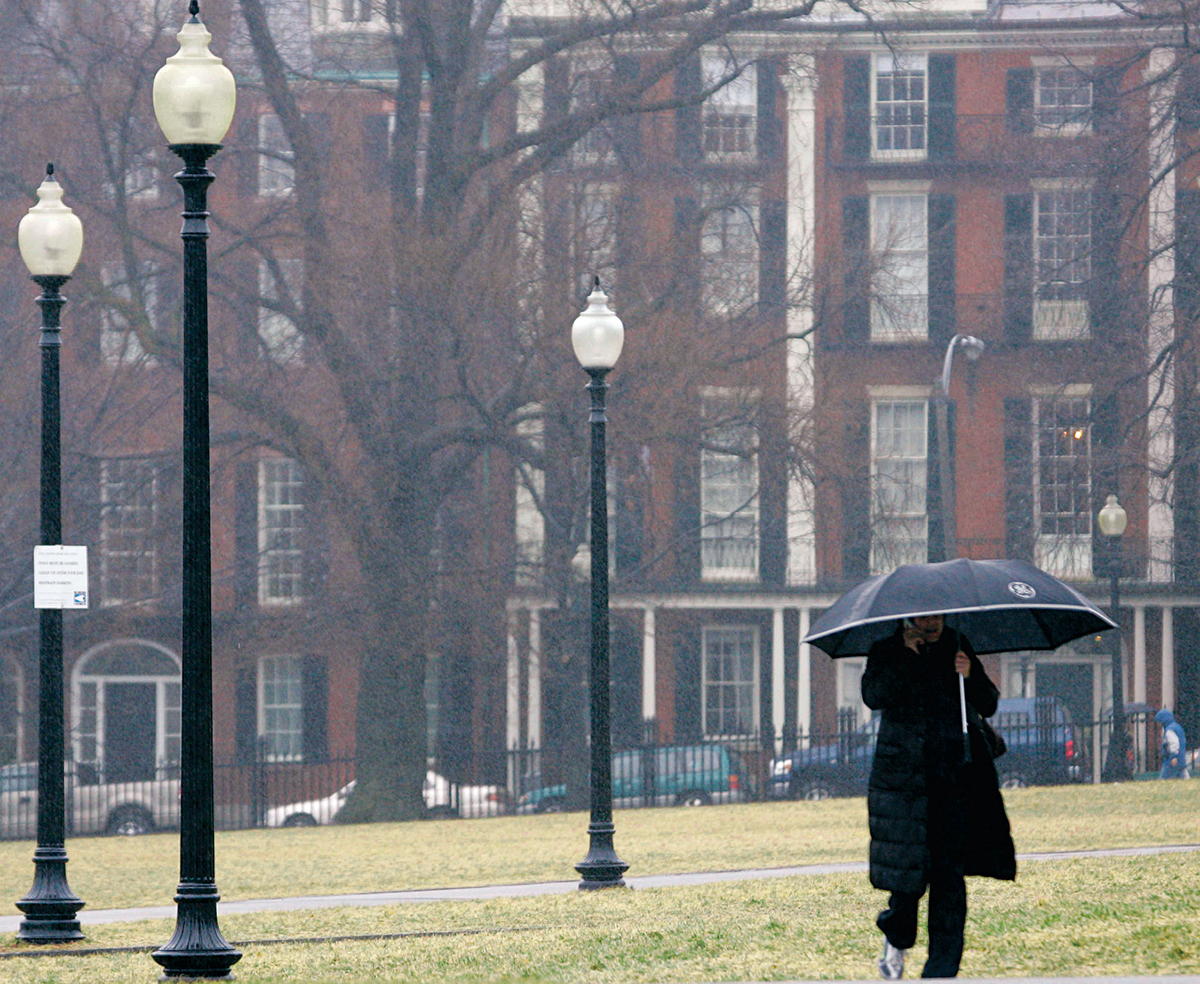Save the Common? Not Without a Fight.

photograph by the boston globe/david kamerman/landov
A Boston City Council committee has been working on a plan to fix up the Common, reversing the effects of a quarter-century of creeping seediness. If this neglected treasure actually means as much to the people of Boston as they like to think it does, the committee’s recently released report will touch off a spirited public debate. There’s much more at stake, after all, than prettying up for tourists.
A center-city park says something about a city’s character. Compared with New York’s dense, elaborate Central Park or Chicago’s sprawling Grant Park, the Common and the Public Garden are less grand, more intimately contoured to the human scale, older and more eccentric. They divide between them the traditional functions of such spaces. The Public Garden is a civic ornament, a role in which it succeeds handsomely. The Common, embodying a more practical ideal of nature in the city, is there to be used. It will therefore always be scruffier than the Public Garden, but, even allowing for that difference, it’s in sorry condition—and not just as a result of wear and tear, since most of the time it’s underused, despite special events ranging from political protests to Shakespeare in the Park. What the rundown, semi-desolate Common says now about Boston is We’re too cheap and crabby to invest in public life.
The city council committee’s proposals for making the Common more inviting include returning disused and misused facilities to service, undoing the butchery committed by the MBTA along Tremont Street, updating the wiring at the bandstand, putting in a carousel, making the athletic fields more versatile, and opening a full-service restaurant. More controversially, the committee calls for a private organization—either a new one or a more robust version of the Friends of the Public Garden—to recruit donors to help plan and fund all these improvements. So far, nobody’s asking the Parks Department to relinquish day-to-day control of the Common, but even donors with no formal authority exert at least some informal control. “Right now, not enough people in this city are choosing to be a part of this park,” says incoming council president Michael Ross, the committee’s chairman. “We have to change that.” When he took me for a tour on a November afternoon, the Common was nearly deserted—except the Frog Pond, where kids packed the ice. “This,” said Ross, gesturing at the happy crowd, “is what the Common should feel like.” He added that drawing more users will also drive down crime.
Public debates about a showcase park say something about a city’s character, too. Like other discussions of Boston landmarks (remember the pre-2004 controversy about replacing Fenway Park?), any beef about the Common will feature a lot of talk about sacred local tradition. A profound inner tension animates such talk, with pride in Boston’s special way of doing things always pushing against the fear that Boston is a second-rate backwater. Voices saying, “Don’t change a single blade of grass on the Common, and don’t turn over our beloved public space to private interests, like they do with parks in cold, cruel, money-grubbing New York,” will sing the usual duet with voices urging us to implement the cutting-edge “best practices” the committee picked up on its fact-finding visit to New York last June.
This signature Bostonian two-mindedness can make it difficult to get anything done around here, but the committee has made a good start on splitting the difference in a practical way. It rejects New York’s privatizing strong-conservancy strategy, for instance, but has selectively learned tactical lessons from the diverse clientele of Central Park’s Boathouse restaurant and from Bryant Park’s role in reviving the neighborhood around it.
Madison Square Park’s dog run also impressed the committee as a workable accommodation between human and canine users, and dog owners who frequent the Common have organized to petition for their own. Should there be a dedicated dog run on the Common? Dogs, like college students, can help a place thrive when they’re part of a mix of users, but they cheerfully befoul and destroy any area you turn over entirely to them. On the other hand, I’ve never seen a Boston dog owner successfully enforce a voice command other than “Follow your bliss,” so it might be better to confine dogs and owners to their own gulag.
I take the dog owners’ synchronized howling as a sign that a genuine popular debate about the Common may yet develop, but it will occur only if a variety of constituencies who use or want to use the Common similarly mobilize themselves to participate in shaping its future. The people of Boston have a chance to prove that the supposedly beloved public space at the heart of their city really does matter to them. So far, only the dog owners have cared enough to bother.
Carlo Rotella is director of American studies at Boston College.